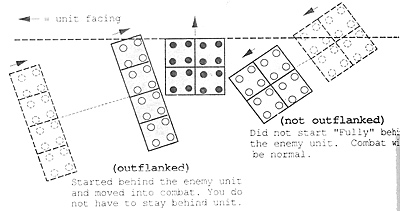 The Napoleon's Battles rules by Avalon Hill has become popular here in Virginia and with the Northern Virginia Gamers (NOVAG). During the many hours of gaming we have had, two aspects of the rules continues to rear its ugly head. The first one is the combat bonus for units on higher ground and second, there are no bonuses for attacking the flanks. After talking with other club members on this, I believe we have come up with a single solution that should take care of both these issues. We have added "flanks" to the rules so that if your attack meets the requirements for a "flank attack" and the enemy fails to roll its response number, you receive a +2 to your attack modifiers. Although an enemy unit defending on higher ground still receives the +1 combat modifier, it has now been nullified by being outflanked (no more playing "king of the hill"). The way to outflank an enemy unit is as follows:
The Napoleon's Battles rules by Avalon Hill has become popular here in Virginia and with the Northern Virginia Gamers (NOVAG). During the many hours of gaming we have had, two aspects of the rules continues to rear its ugly head. The first one is the combat bonus for units on higher ground and second, there are no bonuses for attacking the flanks. After talking with other club members on this, I believe we have come up with a single solution that should take care of both these issues. We have added "flanks" to the rules so that if your attack meets the requirements for a "flank attack" and the enemy fails to roll its response number, you receive a +2 to your attack modifiers. Although an enemy unit defending on higher ground still receives the +1 combat modifier, it has now been nullified by being outflanked (no more playing "king of the hill"). The way to outflank an enemy unit is as follows:
1. You must "start" in a movement phase fully behind the "front" of the enemy unit you are a combat move to (see below).
2. Tell the player of the unit you have moved to contact and that this is a "flank attack".
3. The player of the unit that is outflanked now rolls against his unit(s) response number (plus any attached commanders bonuses) for each enemy unit that has outflanked him (multiple attacks allowed if they meet the requirements).
4. If he fails in his response roll, the attacker receives the +2 modifier. If he succeeds, there is no flank attack modifier and the attack proceeds normally (a successful roll implies that the brigade commander of the outflanked unit has successfully deployed his troops to face the attack on the flank).
Of course, units like the Old Guard with an attached leader would probably succeed almost 100% of the time. I guess that is why they are called the "Old Guard".
Happy gaming.
Back to MWAN #67 Table of Contents
Back to MWAN List of Issues
Back to MagWeb Magazine List
© Copyright 1994 Hal Thinglum
This article appears in MagWeb.com (Magazine Web) on the Internet World Wide Web.
Other articles from military history and related magazines are available at http://www.magweb.com